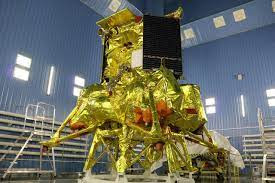Russia's Luna-25 Moon Mission Ends in Unfortunate Crash
Russia's Luna-25 lunar spacecraft has encountered a regrettable mishap, crashing into the Moon after an uncontrolled spin, as confirmed by Russia's space agency, Roskosmos, on Sunday. This incident marks a significant setback for Russia, as Luna-25 represented the country's inaugural moon mission in a span of 47 years.
This unfortunate outcome transpired following a preceding report from Roskosmos, detailing a complication encountered while attempting to maneuver Luna-25 into a designated pre-landing orbit. Despite subsequent efforts on August 19 and 20 to regain contact and ascertain the craft's location, these endeavors yielded no success.
According to Roskosmos' statement, the spacecraft entered an erratic orbit and eventually met its demise through collision with the lunar surface. The malfunction occurred during an endeavor by mission control to transition Luna-25 into a prelanding orbit at 11:10 GMT on the prior Saturday. Communication with the spacecraft was ultimately lost at 11:57 GMT that same day.
Luna-25 had been earmarked for a year-long mission on the Moon, where it would have embarked on soil collection, water search, and other scientific tasks. The extraction of water, in particular, was of interest to enthusiasts due to its potential utility in producing rocket fuel for future launches and supporting potential lunar colonies. The lander was also equipped with cameras, which had successfully captured images of the lunar surface.
In light of this setback, Roskosmos has announced its intention to initiate an investigation into the root causes of the mission's failure. However, no specifics regarding the technical issues responsible have been provided.
The mission's failure not only represents a blow to Russia's space program but also underscores the country's diminished prominence in space exploration since the epoch of Cold War achievements. During that era, Russia made pioneering contributions to spaceflight, including the launch of Sputnik 1 in 1957 and Yuri Gagarin's historic journey into space in 1961.
The Luna-25 mission marked Russia's first endeavor to reach the Moon since Luna-24 in 1976, which occurred during Leonid Brezhnev's leadership. The objective was to execute a soft landing on the lunar south pole, scheduled for August 21.
In conclusion, the Luna-25 mission's unfortunate outcome underscores the intricate challenges and inherent risks associated with space exploration. While the incident is a setback for Russia's space aspirations, it is important to view it as a reminder of the complexities inherent to space missions and the potential for profound learning even amidst setbacks.





Post a Comment